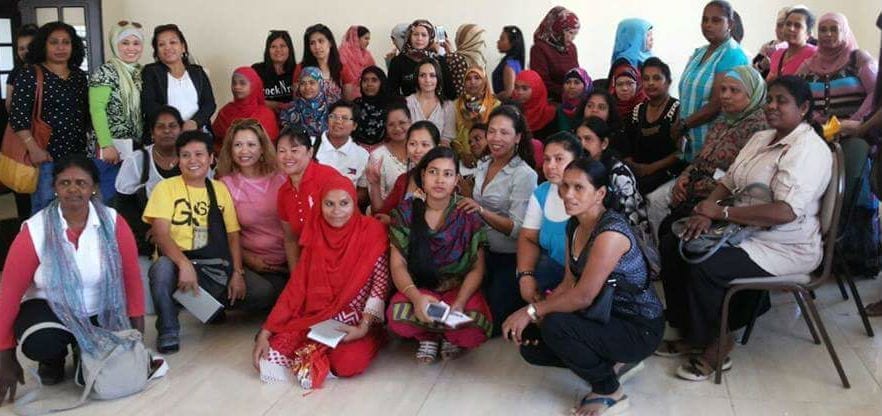Domestic workers in Jordan are set to celebrate the official formation of a worker rights network that includes migrant workers from Bangladesh, Indonesia, the Philippines and Sri Lanka.
The September 19 launch is a first in Jordan and a rare move in the Arab region, where more than 2.4 million migrant domestic workers often toil 12–20 hour days, six or seven days a week cleaning homes, preparing meals and caring for children and the elderly. Migrant workers in Jordan, like in many countries in the Middle East and elsewhere, cannot form unions to improve their working conditions.
“Domestic workers have so many problems” and had no one to assist them until now, says Indrani, who came to Jordan as a domestic worker from Sri Lanka 20 years ago and is now helping build the network by reaching out to domestic workers in the Sri Lankan community.
Fish Ip, Asia regional coordinator for the International Domestic Workers Federation (IDWF), is traveling to Jordan for the event. IDWF members and allies, like the Solidarity Center, helped push for the 2011 passage of the International Labor Organization convention on decent work for domestic workers. Officials from the origin country embassies for the migrant domestic workers will also attend.
Through Trainings, Domestic Workers Take Leading Role
The project began early in 2014, when the Solidarity Center approached leaders in migrant worker communities to discuss plans to combat trafficking of vulnerable domestic workers and assist those experiencing worker rights abuses. Forty-two domestic worker leaders from the largest communities in Jordan—Filipino, Bangladeshi, Sri Lankan and Indonesian—then took part in trainings covering worker rights, anti-human trafficking, assisting domestic workers in finding legal assistance and building worker networks.
This core group began monthly meetings in August to discuss issues, learn from studies and hear from guest speakers on migrant domestic worker issues. They are also connected with IDWF affiliates in their home countries. Network leaders bring new domestic workers to the meetings—“I bring 15 domestic workers with me,” says Indrani. So far, 268 domestic workers have participated in the training workshops and network meetings.
“We know each other, we know how to help each other,” Indrani says. Now that word has gotten around, domestic workers “know how we are helping, now they are asking to come. This time they are the ones reaching for us.”
A key draw for domestic workers is the legal clinic the Solidarity Center launched in October 2014 in partnership with the Adalah Center for Human Rights Studies. The clinic takes place after each meeting, and more than 85 domestic workers have so far sought assistance.
Domestic Workers Seek out Network
“Everyone is coming to me and asking how to get involved,” says May Joy Guarizo Salapare, a domestic worker who has been in Jordan for six years and is helping support her husband and family in the Philippines. She created a Facebook page for domestic workers in Jordan, where she shares news of the network’s meetings and legal clinics.
Guarizo says she frequently encounters domestic workers who “are asking me for help with their employer.” Domestic workers in Jordan, as in other countries, often report that employers have taken their passports, rendering them virtual prisoners, and do not receive their salary for years, she says.
Earlier this year, Guarizo participated in a U.S. Department of State Professional Fellows exchange program and traveled to the United States to examine international models for overcoming the obstacles of reaching and organizing domestic and migrant workers.
Until now, domestic workers in Jordan rarely met others not from their home countries. The new network has “united domestic workers under one umbrella, says Sara Khatib, Solidarity Center anti-trafficking in persons program officer in Jordan. The network is designed to provide a collective voice for migrant domestic workers in Jordan to ensure that they have access to full workers rights.
“Domestic workers here in Jordan are helping each other, all over the full community,” Guarizo says.
Going forward, the network plans to push for laws protecting migrant domestic workers and will continue to recruit and train domestic workers on their rights. They hope to eventually form a union that will be recognized by the Jordanian government.

